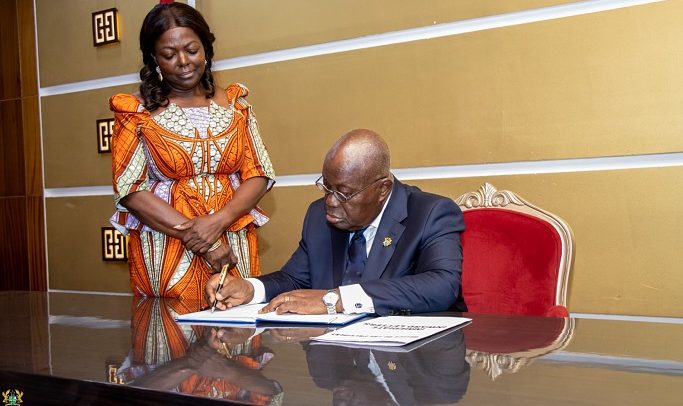President Akufo-Addo signs the compact while the MSWR minister looks on
PRESIDENT Nana Akufo-Addo, has signed a historic presidential compact on water, sanitation and hygiene (WASH), the Ministry of Sanitation and Water Resources (MSWR) has announced.
This forms part of government’s commitment to improving public health, increasing climate resilience and ensuring that hard to reach communities have access to safe and potable drinking water, sanitation and hygiene services.
The compact – the third of its kind in Africa – would see government allocate an estimated US$1.7 billion annually to WASH initiatives nationwide until 2030. These funds would ensure that WASH services reach schools and healthcare facilities, as well as remote communities.
“The journey on which we are embarking is built on the fundamental truth that without WASH services, sustainable development will remain an elusive dream. This compact represents not the start, but the continuation and amplification of our efforts, a decisive step to ensure that every citizen, irrespective of their location or circumstance, enjoys sustainable access to these vital services,” said President Akufo-Addo during the signing ceremony on Wednesday.
“The compact, signed by the President of the Republic, shows how serious we as a country take WASH issues,” added Lydia Seyram Alhassan, Minister for Sanitation and Water Resources in Ghana who also boasted that Ghana brought the compact into fruition just one year after it was announced as a commitment at the UN 2023 Water Conference.
The compact will establish a National Sanitation Authority, which will support government’s efforts to eliminate open defecation by 2030.
Furthermore, Ghana’s national climate strategy will now include building climate-resilient water and sanitation infrastructure and services, ensuring that the country is ready to address the challenges posed by increasing droughts and floods.
The compact is the result of an extensive consultation process with government agencies, development partners, the academic community, and local civil society organizations. It is supported, under the Heads of State Initiatives, by the Government of the Netherlands, the UK Foreign, Commonwealth and Development Office, UNICEF, the Sanitation and Water for All partnership and IRC WASH.
These partners will serve in an advisory capacity for the compact’s implementation, providing technical expertise and coordinated advocacy.
As Ghana leads the way with this Presidential Compact, it sets a powerful example for other countries to follow in the global push for universal access to water, sanitation and hygiene.
BY Nii Adjei Mensahfio


